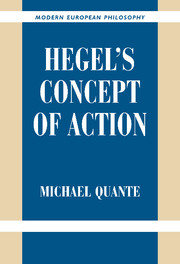4 - The Form of the Action
Published online by Cambridge University Press: 05 September 2009
Summary
Actions as Events: The Causal Relation
Hegel begins the first section of the Morality chapter, which bears the title “Purpose and Responsibility,” with the introduction of a new concept: the deed. The title of that section already makes clear that Hegel is arguing in the context of political and juridical concepts. The concept “deed” is therefore primarily treated in the secondary literature as it functions within this context, or else the concept is perceived as not at all important terminologically. Against this tendency, I will attempt to interpret Hegel's introduction of the concept “deed” from the standpoint of action-theoretic questions. In what follows, I pursue the interpretive hypothesis that “deed” is meant to capture the event-character of actions, their spatio-temporal individuality.
The sections “Purpose and Responsibility” and “Intention and Welfare” present the interpreter of Hegel's Philosophy of Right with great difficulties. A number of the problems in understanding the text are due to Hegel's decision to develop fundamental action-theoretic problematics through the use of juridical concepts and within the context of political philosophy. I will not further pursue this aspect, since the distinction of “person” and “subject” that I have already analyzed is not relevant for the differentiation currently in question. I will also set aside the mode of description of an “act” designated with the concept “legality,” since the distinction between legality and Morality is simply a special case of the general distinction of “deed” and “action” as two modes of description of events.
- Type
- Chapter
- Information
- Hegel's Concept of Action , pp. 105 - 156Publisher: Cambridge University PressPrint publication year: 2004



